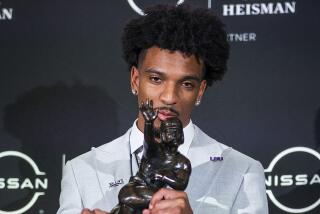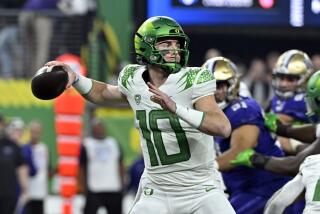Hagan Ran From Gangs, Now Toward the Heisman
BOULDER, Colo. — Sometimes you run.
Darian Hagan was a freshman in high school when he had to make his choice, such as it was. He lived in Watts, an angry ghetto that puts a bounty on many young lives (literally or figuratively) and was closing in on his.
“I got chased home by gangs, shot at by gangs, everything,” Hagan said. “But I didn’t want any part of it.”
So he ran. First to his home and then to sports, in which he excelled on Locke High School’s baseball and football teams, digging the tunnel that would take him out of Los Angeles and one day make him quarterback at Colorado and a Heisman Trophy finalist.
He will start Monday night against Notre Dame in the Orange Bowl, the game that can give the No. 1 Buffaloes their first national championship.
Not all of Hagan’s plays have been successful. He was a freshman last year, and Colorado was tied at 17 with Brigham Young in the fourth quarter of the Freedom Bowl. Sal Aunese, the Buffaloes’ starter who has since been immortalized for his battle with cancer and subsequent death, could generate no offense. Coach Bill McCartney inserted Hagan, who promptly threw an interception that led to BYU’s game-winning field goal.
“Rough game for Darian,” Colorado senior wide receiver Jeff Campbell said. “You could see the way he felt about it.”
He felt bad enough to approach quarterback Coach Gary Barnett and insist he be moved to running back. Not that the request was entirely radical--several teams had recruited Hagan with intentions of moving him--but Colorado wanted him to run its option offense. Hagan stuck with his decision through the winter.
“I had no intention of playing quarterback,” Hagan said. “My confidence was gone after that one game. I knew I could be a running back; a lot of people thought I was a running back playing quarterback, anyway. I went all through winter conditioning thinking that way, right up until a couple weeks before spring practice.”
That’s when Aunese got sick. Barnett called Hagan to tell him Aunese would miss spring drills and probably the season, too. “I told him Sal had cancer,” Barnett said. “He couldn’t believe it. He said, ‘I guess I’ll have to grow up and be a man.’ ”
The realization for Hagan was dramatic and sudden, if also opportune. And he seized it. “He had real big shoes to fill, and I tried to put my arm on his shoulder and console him any time he needed it,” Bill Coleman, a senior offensive tackle and co-captain, said. “But as soon as he stuck his head into the huddle in spring practice, I could see he was ready.”
“I’ve felt guilty, a lot of the time, that I was given my starting position because somebody was stricken with a disease,” Hagan said. “The coaches told me, ‘Just be Darian,’ but it was hard not to think about Sal.”
More to Read
Go beyond the scoreboard
Get the latest on L.A.'s teams in the daily Sports Report newsletter.
You may occasionally receive promotional content from the Los Angeles Times.










